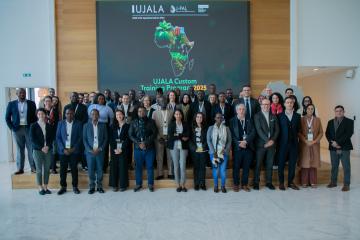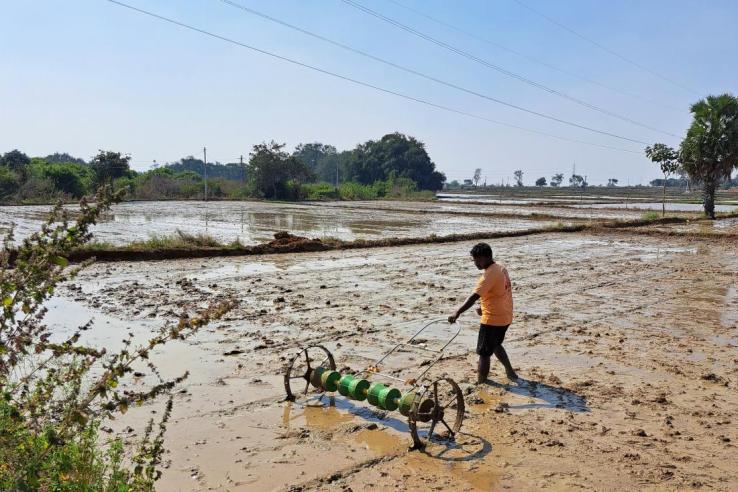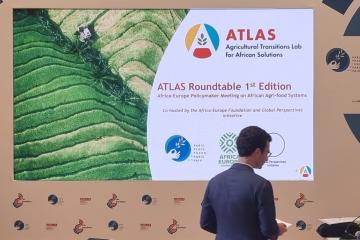
Insights from the field: Exciting new work from aspiring researchers

This piece was originally published by the Center for Effective Global Action (CEGA).
Young Scholars Shaping the Future of Agricultural Policy
The Agricultural and Technology Adoption Initiative (ATAI) funds research to improve farmer welfare through evidence-based policies and programs. ATAI supports research projects conducted by graduate students with guidance from network researchers. In this blog, Karin Mason, former Agriculture Program Intern at CEGA, highlights three ATAI-funded projects led by graduate students Steven Brownstone (UCSD), Piyush Gandhi (UCSC), and Iacopo Bianchi (SU). Steven Brownstone is on the job market for 2024-2025; explore his work here.
In Telangana, India, manual rice transplanting is typically performed by women, contributing to labor-intensive agricultural practices. Steven Brownstone’s ATAI-funded study investigates the implications of drum seeders, a labor-saving technology that eliminates the need for manual transplanting. The intervention reduced barriers to adoption, resulting in a tripled uptake of drum seeders among farmers. However, this technological shift led to lower wages for women laborers, indicating challenges in finding alternative short-term employment. Drum seeders not only impact local labor dynamics but also offer environmental benefits by potentially reducing methane emissions from rice cultivation, which currently accounts for half of all crop-related greenhouse gas emissions. This dual impact makes drum seeders a particularly compelling intervention to study, as they address both labor efficiency and environmental sustainability in rice production.
Crop residue burning is a common practice in Punjab, India that poses severe health and environmental risks. This practice accelerates hazardous air pollution and soil degradation while exacerbating greenhouse gas emissions. Building on his ATAI-funded proposal development project on bio-decomposer technology for stubble burning, Piyush Gandhi is now evaluating the impact of a program subsidizing Early Maturity Variety (EMV) seeds and technical training on sustainable residue management. EMV seeds and technical training could be a promising way to reduce residue burning by offering farmers viable alternatives to traditional practices, potentially addressing both the time constraints that lead to burning and and the knowledge gap in sustainable residue management techniques.
In Uganda, gender disparities in agricultural productivity are well-documented, but the role of labor markets in perpetuating these gaps remains understudied. Iacopo Bianchi, along with colleagues Cristina Clerici and Stefano Tripodi, is investigating gender disparities in Uganda’s rural labor markets. Their research unpacks the role of labor markets in the well-documented gender gap in agricultural productivity. The preliminary findings of this study highlight unique challenges faced by female farm managers when accessing and managing agricultural labor, suggesting potential avenues for addressing them. For instance, Bianchi notes that improved access to affordable third-party monitoring services or programs aimed at fostering worker accountability may offer promising ways to enhance productivity. This approach is particularly valuable as it targets the root causes of gender disparities in agriculture, potentially leading to more effective and sustainable solutions for improving women’s agricultural productivity in Uganda.
Leading evidence development in agricultural research
When asked about what excites them most about providing insights into critical problems in agriculture, the researchers shared diverse perspectives: Brownstone emphasized the interdisciplinary nature of agriculture, noting its intersection with technology, economics, and climate. He shared his enjoyment at “how collaborative and global the field is becoming.” Gandhi expressed enthusiasm for engaging and learning directly from farmers. Bianchi found motivation in contributing to meaningful solutions for challenges that have not yet been well-documented or fully explored. He emphasized the potential to inform interventions “that can improve equity and productivity” in agricultural communities.
Advice for aspiring researchers
Drawing from their experiences, the researchers offered valuable advice for those looking to enter the field:
- Engage directly with farmers: Brownstone stressed the importance of spending time “literally in the fields,” noting that it not only generates research ideas but also builds credibility with implementers.
- Plan ahead: Gandhi advised starting early, particularly given the time-sensitive nature of agricultural interventions and funding cycles.
- Start small and be adaptable: Bianchi recommended beginning with pilot studies, exploratory research, and/or focus groups to test ideas and develop a strong understanding of the context before scaling up.
- Prepare for challenges: All researchers acknowledged the unpredictable nature of field research, emphasizing the need for patience, flexibility, and creativity.
- Embrace the learning process: Despite the challenges, the researchers unanimously agreed that the experience was invaluable and rewarding. In Bianchi’s words, “field research rarely goes exactly as planned, but those unexpected challenges often lead to the most valuable lessons and insights.”
The work of these young researchers exemplifies the role of research in addressing critical global challenges. From reducing greenhouse gas emissions to gender disparities in rural labor markets, their projects are not only advancing academic understanding but also informing real-world policies and practices. As we face increasingly complex agricultural and environmental challenges, the insights and innovations emerging from this new generation of researchers offer hope for more sustainable, equitable, and productive agricultural systems worldwide. Their experiences underscore the importance of continued support for early-career researchers in agriculture, whose work today may shape the policies and practices of tomorrow.
References:
1. https://www.pnas.org/doi/full/10.1073/pnas.1809276115


